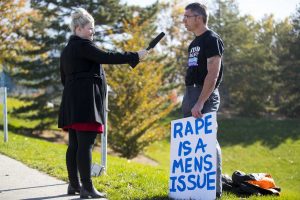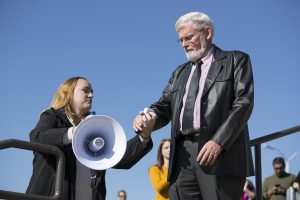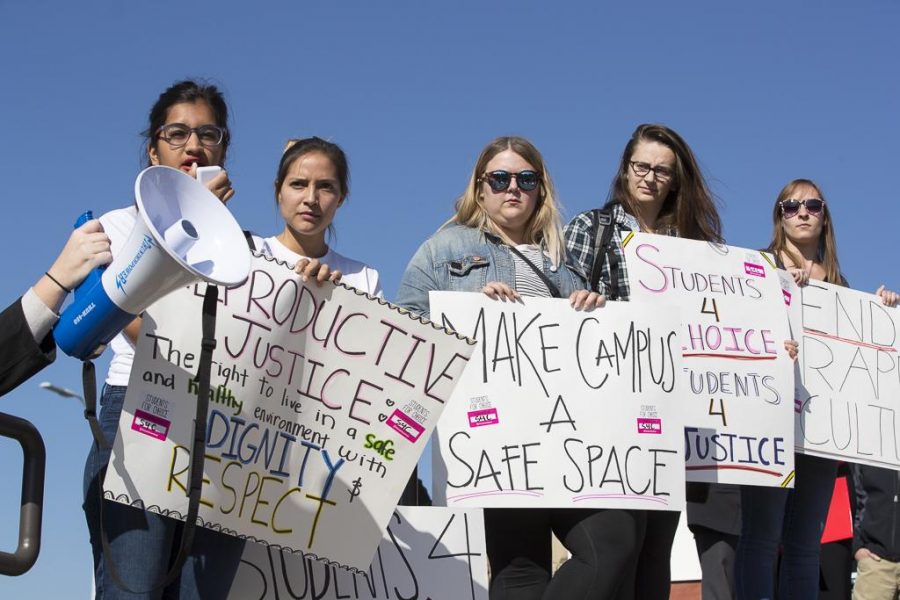Following the aggravated rape that occurred in the parking lot of the Merrill Engineering Building on Halloween, a group of students protested. The protest was led by four graduate students who all work as Practicum Counselors at the Women’s Resource Center on campus: Tara Downing, a third-year masters student in mental health counseling at Westminster College; Maria Skedros, a third-year masters student in social work; Amber Whiteley, a third-year doctoral student in counseling psychology; and Salvia Artman, a third-year doctoral student in counseling psychology.
President David W. Pershing also attended in order to hear the concerns and share his own thoughts.
The organizers of the protest stress that their opinions are not those of the Women’s Resource Center and the protest was not an event put on by the center. However, they chose to hold this event because of their own experiences working at the center.
“We work with survivors,” said Downing. “We hear their stories. We want it to stop. We want the University to be responsible for stopping the violence and not individual students, faculty, or staff. The University has power that individuals do not, the University should use its voice to speak up for survivors and speak against violence.”
The protesters had several objections to the U’s response to this specific sexual assault as well as in general.
Their criticisms surrounding Monday’s sexual assault center on communication.
“We didn’t get the message that police did not believe the gun was still on campus for an entire day.” Downing said, “That made many question if, perhaps because it was a sexual assault, the University was not taking this seriously.” It’s Downing’s belief that, “It is the job of the administration to take action to protect all people on campus. We did not hear messages about how ‘we’ as the administration will not tolerate sexual violence on campus.” At least, not until President Pershing’s email Thursday morning, which said exactly that.
While they note that sexual assault certainly doesn’t happen only to women, Downing said, “We are also concerned that many of the messages [involve how women] should take care of ourselves.” This includes advice like taking self-defense classes, being aware of the surrounding environment and getting an escort on campus.
One of the reasons they object to advice like this is because, according to RAINN, the vast majority of rapes are committed by someone the victim knows and victims often don’t perceive the need for self-defense in such situations. Research published in the Nature Reviews Neuroscience journal also shows that cognitive functioning — including the ability to make reasoned decisions — is impaired during high stress situations, so victims may not be capable of reasoning out the best way to defend themselves in the moment.
The second reason is that they fear these messages are contributing to the harmful narrative that “women and other populations such as LGBTQ+ and gender fluid individuals [who are raped] are responsible for their own attacks.”
These graduate students say the administration needs to do two main things to better address sexual assault on campus: increase funding and educate students.
Whitely said, “[we] believe that the lack of funding that goes towards both preventative services as well as counseling services on campus is abysmal.” Downing agrees, saying “additional funding to offices that provide support for students is desperately needed.”
They also support funding for increased security on campus. Whitely said that “[The] issue of increasing security on campus is complex because often the steps included can contribute to [that] rape myth that women are primarily sexually assaulted by strangers in the dark.” She believes that, “[increasing] security measures on campus, such as installing more lights or more security cameras, is more of a measure to send messages to perpetrators that the University takes safety seriously.”
According to the email sent by President Pershing on Thursday, improvements in campus security such as more lights and security cameras are in the process of being planned and implemented.
The protesters’ most detailed objections and suggestions are about education needs on campus. They advocate for increased consent education — especially to incoming freshmen, transfer students and international students — as well as “trauma-informed care for all staff and faculty who interact with the student population” and bystander education, according to Whitely.
Darrah Jones, a sexual assault support advocate through the Center For Student Wellness was at the protest. She said one of the problems with addressing assault is that most students are unaware of campus resources available for victims. “Free and confidential services are available to any member of the University community,” Jones said.

Academic adjustments are available for victims, she said. “Survivors have a right to feel like they can continue to pursue their education. We want [them] to continue to pursue their education. We want them to be here, we want them to graduate and we want them to feel safe in doing so.”
Student Athena Schwartz, who also attended the protest, said she was troubled when she received a text alert about the assault on campus. When she heard about the protest through her humanities teacher, she was inspired to show up and offer solidarity.
“I wanted to show my support for the victim,” the 17-year-old freshman said. “This is not an okay experience to go through. The U, as well as other college campuses, should’ve shown more safety measures beforehand.”
Another freshman, Jenna Lee Martin, agrees that more prevention measures and education should be put in place. “It shouldn’t have to take being raped to know what rape is,” said Martin, also 17. “A knowledge of consent shouldn’t come from being victimized.”
The protest’s organizers feel encouraged that President Pershing was present to hear the concerns put forth by them and all the others in attendance. However, Whitely said “We believe it shouldn’t have taken an incident of a woman being sexually assaulted at gunpoint to have addressed the issues of safety on campus.”

President Pershing was brought to tears. When he spoke, he agreed that more work needs to be done to address sexual assault at the U and said that no one should have to be afraid.
In an email to a protester about the event, Salt Lake City Mayor Jackie Biskupski said, “I applaud you and your fellow students for using your voices to demand greater accountability and safety at the U.” She said that safety is necessary to “truly foster an environment of academic achievement.” Mayor Biskupski said she couldn’t attend the protest but would be there “in spirit”.
On Thursday, supportive stories about sexual assault, several saying they occurred on campus, appeared written in sidewalk chalk around the MEB. The organizers of the protest said that wasn’t their idea, but Whitely said, “We support survivors of violence in healing in any way that they choose. We hope that survivors will own their power in whatever way they choose. We certainly support [that effort].”
e.vandersteen@dailyutahchronicle.com
@EliseAbril
c.richards@dailyutahchronicle.com
@misterclovis


